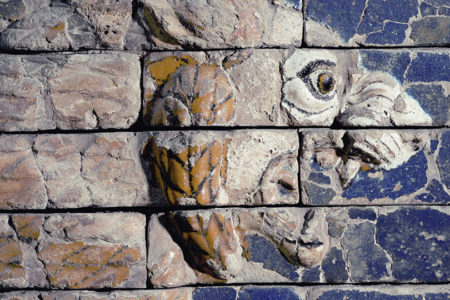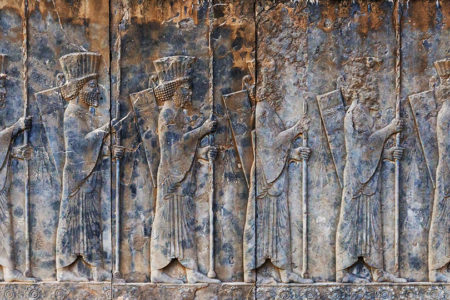Vision Four: Israel’s Cleansing
Zechariah 3:1-10
God specifically chose Israel to be a holy nation in which He could manifest His grace and truth to mankind (Ex. 19:5–8). Failing to live up to her elective calling, Israel committed gross immorality and idolatry, resulting in her captivity in Babylon for seventy years. After King Cyrus of Persia conquered Babylon (539 B.C.), the Jewish people were granted permission to return and rebuild their Temple in Jerusalem (Ezra 1:1–4).
Zechariah’s call to repentance (Zech. 1:1–6) indicated that the returnees were not spiritually prepared for their new life in Jerusalem. It was not enough for Israel to be restored to her land; she needed to be cleansed from the Babylonian culture and defilement of sin in order to experience total restoration and renewed communion with God. Israel’s cleansing is the theme of vision four.
Vision four is unlike the first three visions. In the first three, Zechariah asked questions because there was an interpreting angel to answer them. Vision four contains no questions and no interpreting angel. Instead, the meaning of this vision is revealed as the text unfolds.
Joshua’s Condemnation
The vision opens with Zechariah witnessing a trial in the court of heaven. Three figures are present. The prophet wrote, “And he showed me Joshua, the high priest, standing before the angel of the LORD, and Satan standing at his right hand to resist him” (v. 1).
The Accused: Joshua. Joshua was Israel’s high priest. He journeyed with Zerubbabel in the first wave of returns from Babylon and is presented as standing before the Lord, which, for a high priest, was the place of service.
However, before the high priest can minister, he must be ritually clean (Lev. 21:10–15). In this court scene, Joshua stands before the Lord “clothed with filthy garments” (v. 3). Actually, they are covered with excrement, the vilest type of uncleanness. Such defilement makes Joshua ritually unclean and disqualifies him to function as Israel’s high priest before the Lord.
No specific charge is brought against Joshua. But the priest’s filthy garments represent both his and Israel’s unclean state. Like Joshua, sinful Israel must be cleansed and reinstated to its priestly office before God can dwell in the midst of Jerusalem (2:10).
The Prosecutor: Satan.Satan stands at Joshua’s right hand, ready to resist or accuse him (3:1). The right hand was the traditional place an accuser stood in a Jewish court of law. In Hebrew, Satan means “adversary” or “accuser.” Although he is pictured as standing ready to accuse Joshua, no accusation appears in the text.
Satan has access to God’s throne, where he accuses God’s people day and night (Job 1—2; Rev. 12:10). Likewise, in his zeal to charge Joshua with sin, Satan charges Israel as well. He stands ready to reveal Israel as unworthy of God’s elective calling and blessing.
Satan’s evidence against both Joshua and Israel is indisputable before the court of a holy and just God. Yes, Satan is right. Joshua and Israel are guilty of sin and worthy of judgment. Satan would rest his case, confident of a guilty verdict, if it were not for God’s grace. It has been rightly said, “When Satan talks to us about God, he lies, but when he talks to God about us, he tells the truth!”1
Israel’s Advocate: The Angel of the Lord. The personal advocate for Israel answers the accuser: “And the LORD said unto Satan, The LORD rebuke thee, O Satan; even the LORD, who hath chosen Jerusalem, rebuke thee. Is not this a brand plucked out of the fire?” (v. 2).
The word LORD appears three times in verse 2. But it applies to two persons. The first LORD is “the angel of the LORD,” who has already been identified as the pre-incarnate Christ (1:11–12). He is a different person from the LORD who rebukes Satan. That LORD is God the Father. God administers the rebuke directly, decisively, incisively, sternly, and with finality. The rebuke is mentioned twice to enforce its meaning.
God’s elective grace and purposes for Israel take precedence over any accusation or attack Satan might bring against the nation. Divine, unmerited grace is the only basis for the Lord’s election of Israel (Dt. 7:6–11). The Lord’s grace and covenant relationship with Israel guarantee the nation will survive Satan’s continual attempts to annihilate it as long as the earth exits (Jer. 31:35–37).
God substantiates Israel’s survival by posing a rhetorical question: “Is not this a brand plucked out of the fire?” (v. 2). Pulling a burning branch from a fire rescues it from complete consumption. Israel has often been delivered from destruction: the Egyptian captivity (Dt. 4:20); the Assyrian invasion of the ten northern tribes (Amos 4:11); the Babylonian Captivity (Isa. 48:10); and, in the future, the Great Tribulation (Zech. 13:9). God promises to defend and deliver Israel from all her enemies, especially Satan. Israel, like the burning bush in Exodus 3, will go through the fires of affliction but will never be consumed.
Joshua’s Cleansing
Standing before the court in loathsome garments stained with excrement, Joshua and Israel are unworthy of God’s mercy, defense, acquittal, and blessing. Both stand helplessly condemned in sin, unable to defend or deliver themselves.
Then Israel’s advocate, the Angel of the Lord, addresses Joshua’s uncleanness:
Now Joshua was clothed with filthy garments, and stood before the angel. And he answered and spoke unto those who stood before him, saying, Take away the filthy garments from him. And unto him he said, Behold, I have caused thine iniquity to pass from thee, and I will clothe thee with change of raiment. And I said, Let them set a clean turban upon his head. So they set a clean turban upon his head, and clothed him with garments. And the angel of the LORD stood by (vv. 3–5).
At the Lord’s command, angels remove Joshua’s soiled garments and replace them with clean, rich, festive robes—a symbol of purity and righteousness. Zechariah, caught up in the thrilling prophecy, boldly interrupted the proceeding and said, “Let them set a clean turban upon his [Joshua’s] head” (v. 5).
The glistening clean turban was a large head wrap worn by the high priests. Tied on it was a gold plate engraved with the words HOLINESS TO THE LORD (Ex. 28:36–38). Placing the turban on Joshua’s head is symbolic of his moral and spiritual cleansing, making him fit to be reinstated as Israel’s high priest. It also symbolizes Israel’s future cleansing and reinstatement as “Priest” and “Ministers” of God (Isa. 61:6; cf. Ex. 19:6) in the Millennial Kingdom. The Angel of the Lord (preincarnate Christ) stood by, blessing the procedure.
Joshua’s Charge
The Lord charges Joshua concerning his obedience and faithfulness:
And the angel of the LORD protested unto [admonished] Joshua, saying, Thus saith the LORD of hosts, If thou wilt walk in my ways, and if thou wilt keep my charge, then thou shalt also judge my house, and shalt also keep my courts, and I will give thee places to walk among these who stand by (vv. 6–7).
Three divine blessings were promised to Joshua if he fulfilled two conditions spoken in this charge. The first condition was to “walk in my [God’s] ways.” Joshua was to conduct himself in keeping with the Lord’s commandments. The second condition was “to keep my [God’s] charge,” or faithfully perform his priestly service with fidelity to the Lord. Then Joshua would enjoy three blessings: He would be a ruler of God’s Temple; be a protector of the Temple from idolatry and ungodly practices; and, like the angels, have access to God.
Joshua’s Cleansing Confirmed
God Himself addresses Joshua and his fellow priests with a long-awaited announcement:
Hear now, O Joshua, the high priest, thou, and thy fellows who sit before thee; for they are men wondered at; for, behold, I will bring forth my servant, the BRANCH (v. 8).
“Hear now,” indicates that this message was extremely important and must be given full attention. The men sitting with Joshua are “wondered at”; that is, they are a sign or foreshadowing of Israel’s future conversion, cleansing, and ministry. When will this great transformation take place? It will occur at Messiah’s Second Coming, when He redeems Israel and cleanses her from sin. Three Messianic terms are used to describe the Messiah, who will bring cleansing to Israel.
First, He is called “my servant” (v. 8). Christ is clearly identified as the Servant of the Lord, who came to do the Father’s will by redeeming mankind (Isa. 42:1; 49:3–4; 50:10; 52:13; 53:11).
Second, He is called “the BRANCH” (v. 8). The word Branch is a proper name for the Messiah and is used by Zechariah (cf. 6:12) and Jeremiah (Jer. 23:5–6) in this way. Messiah, “the Branch,” will remove Israel’s iniquities and bring cleansing to the nation at His Second Coming. More will be said of Christ the Branch in chapter six.
Third, He is called “the stone.” Zechariah describes the stone and its application:
For, behold, the stone that I have laid before [held out to] Joshua; upon one stone shall be seven eyes; behold, I will engrave the engraving of it, saith the LORD of hosts, and I will remove the iniquity of that land in one day (v. 9).
Throughout Scripture the Messiah is seen as a stone of stumbling (Isa. 8:14; Rom. 9:32–33), rejected stone (Ps. 118:22–23; Mt. 21:42), smitten stone (Ex. 17:6; 1 Cor. 10:4), a smiting stone at His Second Coming (Dan. 2:34–35), and the cornerstone (Ps. 118:22–23; Mt. 21:42).
Evidence is provided by God the Father to confirm that the Stone refers to the Messiah: (1) “Seven eyes” on the stone denote His infinite intelligence and omniscience (Isa. 11:2; Zech. 4:10; Rev. 5:6). (2) The engraving on the stone is not revealed, but the statement must have something to do with the Messiah’s future removal of Israel’s iniquity. (3) The sentence I will remove the iniquity of that land in one day refers to Israel’s redemption at the Messiah’s Second Coming. God will pour out His Spirit on the people of Israel, and they will repent bitterly over their sin and be saved (Zech. 12:10— 13:1; Rom. 11:25–27).
The phrase in that day (v. 10) is eschatological. It pictures the time when Israel will experience peace, prosperity, and productivity in the Messianic Age. Neighbors sitting under “the vine and under the fig tree” (v. 10) speak of the peace and contentment that will characterize this period.
God’s divine purpose for Israel continues to be immutable and secure. In that day, Israel will be like a burning branch rescued from the fire of annihilation. She will be cleansed from sin, clothed in righteousness, and forged into a kingdom of priests who will minister to the world.
This revelation of God’s faithfulness to Israel gave Zechariah and Joshua hope and encouragement. In every age, Jewish people who anticipate the Messiah’s return and reign can likewise take hope in His promises. God has kept, and will keep, His promises to Israel.
ENDNOTE
- Warren W. Wiersbe, Be Heroic (Colorado Springs, CO: Victor Books, 1997), 98.






